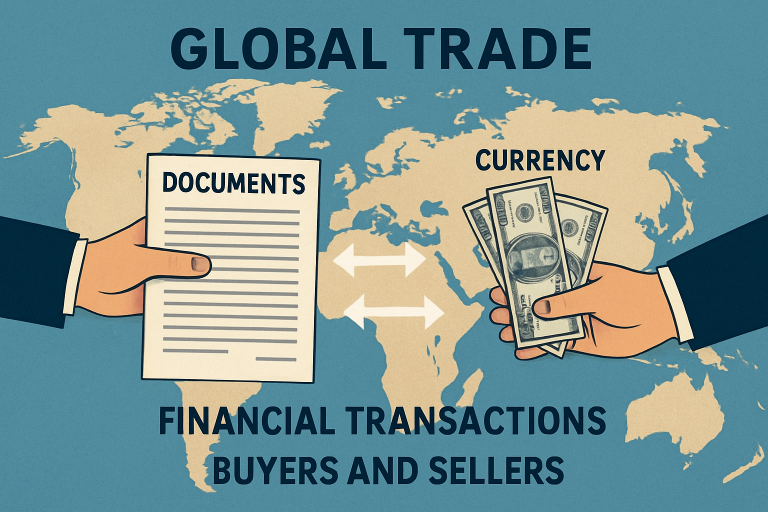Key Takeaways
- Trade finance provides the financial backbone that keeps global supply chains running smoothly.
- Innovations in trade finance help businesses adapt to economic shifts and build resilience.
- Understanding trade finance can benefit exporters, importers, and anyone interested in international business.
- Data from recent reports highlights how pivotal trade finance is for both small and large enterprises.
- New regulations and technological advancements are changing the face of trade finance.
What Is Trade Finance?
Trade finance is an essential suite of financial solutions that supports international and domestic trade transactions. By providing working capital, payment guarantees, and risk protection, trade finance bridges funding gaps and addresses trust issues between buyers and sellers in global supply chains. Clever use of trade finance not only promotes smoother commerce but also enables businesses to seize growth opportunities, even in rapidly changing environments. In regions like New Zealand, tailored Trade Finance Products New Zealand empower exporters and importers to maintain momentum in the global marketplace.
Facilitating transactions between buyers and sellers who are separated by vast distances, trade finance minimises risk and enhances liquidity. With the right mix of tools, companies can secure payment before shipment, extend credit when necessary, and assure suppliers of timely compensation. These mechanisms help mitigate uncertainties and keep trade moving—regardless of international financial fluctuations or geopolitical disruptions.
Key Components of Trade Finance
Trade finance includes multiple instruments, each designed to solve pain points encountered in cross-border transactions. Letters of credit guarantee a seller’s payment, even if a buyer fails to pay. Export credit insurance protects exporters against buyer default, while receivables finance helps businesses convert invoices into immediate cash flow.
- Letters of Credit: Essential for assuring suppliers that they’ll be paid after delivering goods, backed by banks or financial institutions.
- Export Credit Insurance: Covers the risk of non-payment among overseas buyers, offering peace of mind amid economic uncertainty.
- Receivables Finance: Turns outstanding invoices into working capital, allowing businesses to invest back into operations without waiting for payment cycles.
Benefits For Businesses, Big and Small
The impact of trade finance extends to both established multinationals and agile small- to medium-sized enterprises (SMEs). Over 80% of world trade relies on some form of trade finance, reinforcing its status as a global economic backbone. For SMEs, tailored financial products open new markets, prevent cash flow shortages, and insulate companies from counterparty risks. Meanwhile, large corporations leverage advanced trade finance systems to optimise their supply chains, manage large-scale projects, and remain competitive worldwide. According to Investopedia, trade finance encompasses a variety of instruments and strategies designed to facilitate international trade, ensuring that transactions are secure and efficient.
Access to trade finance is critical in overcoming market entry barriers, supporting business expansion, and building resilience against unpredictable disruptions. By providing businesses with flexible funding options and protection from non-payment risk, trade finance helps bridge the gap between ambition and execution.
Challenges in Today’s Trade Finance Landscape
Despite the sector’s pivotal role, many businesses—particularly SMEs—struggle to obtain adequate trade finance. Estimates from industry analysts place the global trade finance gap at nearly $1.7 trillion. Tightened banking regulations, requirements for collateral, and limited digital adoption restrict access, especially in developing economies and underserved markets. Efforts from regulators and the private sector are underway to create more inclusive financial solutions, streamline compliance processes, and encourage innovation.
Technology: Reshaping Trade Finance
Digital transformation is revolutionising how trade finance operates. Emerging technologies such as blockchain, artificial intelligence, and automated platforms have made transactions faster, more transparent, and less reliant on paper documentation. By eliminating manual processes, these innovations reduce the potential for fraud and significantly improve efficiency. Fintech startups and established banks alike are rolling out digital trade finance solutions, making it easier for even small enterprises to participate in global trade.
Regulatory Changes You Should Watch
Evolving international trade and anti-money laundering regulations are influencing the trade finance landscape. Increased calls for supply chain transparency, environmental and social governance, and streamlined compliance standards directly impact how businesses access trade finance. Companies must stay informed about both domestic and international regulatory changes to remain compliant and mitigate exposure to regulatory risk.
Tips for Businesses Seeking Trade Finance
- Assess your typical trade cycle and select the tool (letter of credit, invoice factoring, etc.) that fits your needs.
- Partner with trade finance providers that specialise in your sector and offer deep knowledge of your target export/import countries.
- Invest in digital solutions to enhance transaction speed and accuracy.
- Keep organised, up-to-date financial and trade documentation to improve your approval chances.
- Engage with professional advisors and stay tuned to both policy and technological developments impacting trade finance.
Future Trends in Trade Finance
The trade finance sector is on the cusp of significant evolution, shaped by ongoing automation, integration of emerging technologies like blockchain, and the rise of sustainable financial products meeting growing environmental and social criteria. As digital adoption increases, expect faster onboarding, smarter compliance, and greater access to finance for underserved businesses. Enterprises that proactively embrace these trends will be better positioned to navigate global uncertainty, ensuring their supply chains and financial strategies can weather whatever challenges the future brings.
Lynn Martelli is an editor at Readability. She received her MFA in Creative Writing from Antioch University and has worked as an editor for over 10 years. Lynn has edited a wide variety of books, including fiction, non-fiction, memoirs, and more. In her free time, Lynn enjoys reading, writing, and spending time with her family and friends.















